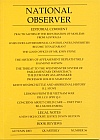
 |

National Observer Home > No. 56 - Autumn 2003 > Editorial Comment When Does Governmental Control over Universities Become Totalitarian?The recent closure by the Commonwealth Government of a private university (Greenwich University, which was set up in Norfolk Island in 1998) raises important questions relating to governmental control over universities. It may be thought that for private universities not funded from public funds governmental control should be minimal. The dissemination of learning should not be a state monopoly. Here different considerations apply to universities than to schools. In the latter case, where minors are involved, a laying down of relevant standards is appropriate, but only so far as the protection of students is concerned and not in order to impose political or social viewpoints or advance bureaucratic controls. But in the case of universities there should be minimal interference by government. Universities are judged by their reputations and the quality of their graduates. Employers and others are able to differentiate between different universities and their respective graduates, and governments should not be entitled to close one university merely because its graduates are thought to be different from, or even inferior to, those from another university. Indeed, amongst government-funded universities themselves great differences in quality are already evident. The plethora of new public universities has unfortunately created a class of inferior graduates. University degrees have become debased. Courses are taught in such subjects as feminist studies and Aboriginal studies, and in many cases students emerge with less intellectual training and rigour than would once have been expected of school matriculation graduates, when higher academic standards were the norm. At a time when there are such discrepancies in the standards of public universities it is particularly unfortunate that the Commonwealth Government, especially under Dr. David Kemp and Dr. Brendan Nelson, has permitted itself to be led by bureaucrats in the Department for Education, Science and Training to discriminate against private universities in order to achieve a monopoly of publicly funded universities. The attack on Greenwich University (which had employed highly-regarded staff, with generally superior qualifications to those in most public universities) has been referred to in an earlier issue of National Observer. The attack resulted finally in legislation passed in the Federal Parliament in late 2002. This legislation effectively closed Greenwich University. (It required universities in Territories to be "listed" on a government-approved list, and Greenwich University was not so listed.) This action of the Commonwealth Government (for which Dr. Nelson was primarily responsible) was strongly opposed by the Government of Norfolk Island. There was no genuine consultation with that Government, which was over-ridden in a manner that might be regarded as contemptuous. Indeed, in the Norfolk Island Parliament the matter was debated on 20 November 2002, and a resolution of protest was passed unanimously: "That this House expresses its regret at the recent rushed passage of Commonwealth legislation regarding Greenwich University without any genuine consultation with the Norfolk Island Government and in the absence of appropriate transitional and compensation provisions, and condemns the responsible Federal Minister for refusing to meet with representatives of Greenwich University to discuss the issues, failing to respond to the Norfolk Island Government's attempts to consult about the matter, and misleading the Australian Parliament and the Australian people." The closing of Greenwich University has raised doubts about the capacity of Dr. Brendan Nelson, the current Minister for Education, Science and Training. It is essential that Ministers should examine critically the advice that they receive from their Departments. All too often departmental advice is self-interested, in the sense that the promotion of bureaucratic power is involved. This is especially so in the present case. The Departmental policy has been to discourage privately-funded universities, and to apply to them harsher standards than to publicly-funded universities. Private universities are seen as a threat to bureaucratic control. Dr. Nelson has not exercised proper supervision and control over his Department, and moreover his attitude towards the Norfolk Island legislature has been tactless at best and insulting at worst. Private universities are needed in Australia, to give rise to variety and the free expression of views, and the suppression of Greenwich University evidences a serious threat to academic diversity. National Observer No. 56 - Autumn 2003 |
|